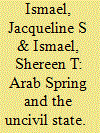| Srl | Item |
| 1 |
ID:
124601


|
|
|
|
|
| Publication |
2013.
|
| Summary/Abstract |
This article examines the ongoing Arab Spring uprisings. The Arab Spring is characterized as a fundamental challenge to the postcolonial political order of the Arab world. The postcolonial Arab world has been defined by its oppressive nature and its subjugation within the international system. This autocratic and peripheral order represents the political legacy of colonial rule, where the postcolonial regimes inherited and refined the repressive techniques of the colonial regimes while, owing to international developments, reinforcing their subjugated status within the international system. The Arab Spring has, thus, represented an attempt to chart an independent path in Arab politics, marked by efforts towards democracy and civil rights. The successes and failures of the Arab Spring are critically evaluated, paying special attention to the role played by Islamist political actors. Beyond an evaluation of the domestic factors behind the various protests, the regional significance of the uprisings is evaluated, providing discussion of counterrevolutionary forces and political-sectarian developments.
|
|
|
|
|
|
|
|
|
|
|
|
|
|
|
|
| 2 |
ID:
163860


|
|
|
| 3 |
ID:
101922


|
|
|
|
|
| Publication |
2011.
|
| Summary/Abstract |
The 1940 Franco-Thai border conflict coincided with the beginning of a four-year campaign to weaken the Catholic Church's position in Thailand. The government closed down schools, confiscated property and imprisoned clergy. Angry mobs looted and burned churches, while the local populace boycotted businesses owned by Catholic Thais. The state-led persecution was part of a broad effort to deal with the legacy of western imperialism in Thailand. Catholicism's strong association with French colonialism, combined with France's decline, made the Church the ideal target for anti-imperialist forces. This overlooked incident provides strong evidence that Phibun Songkhram's strategy was not simply to survive the war, as historians have often claimed. The anti-Catholic campaign, which complicated the country's post-war status, was part of an attempt to re-position the country vis-à-vis the West and provide complete independence for Thailand.
|
|
|
|
|
|
|
|
|
|
|
|
|
|
|
|